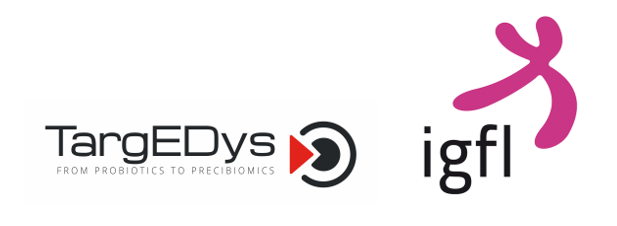TargEDys® announces the publication in Science of a new preclinical study on the precision probiotic Lactiplantibacillus plantarum WJL (LpWJL) in juvenile mice growth optimization, conducted by the Institute of Functional Genomics in Lyon (IGFL) and its

This study* completes and extends what was already published about the strain-specific beneficial properties of LpWJL.
Dr. Martin Schwarzer, first author of the publication, and the group of researchers led by Dr. François Leulier, go further and establish LpWJL benefits in conventional mice, bearing a full microbiota. In addition, the peer-reviewed article shows the benefits extend to the heat-killed bacterium and even isolated cell wall fragments. This highlights the potential of LpWJL as a potent probiotic supporting juvenile growth and components of its cell wall as novel postbiotics.
Main results
In a brilliant succession of experiments in mice over a span of 8 years, the scientists demonstrated the reproducible beneficial effects of LpWJL (alive, heat-killed, or its isolated cell walls) for stunted juvenile mice growth: the LpWJL-supplemented mice grew 3.5% longer in size and 10% heavier at 8 weeks of age compared to the placebo group despite chronic undernutrition. In addition, the strain benefited the mice’s anabolism by supporting energy metabolism, with significantly faster glucose clearance, reduction of the glycemic peak, and improved insulin levels in serum.
Strain-specific mechanism of action
The investigators also proved that these probiotic properties are strain-specific and involve NOD2 signaling. Indeed, genetically-deficient mice for the NOD2 genes (NOD2-/-) or mosaic mutant mice with NOD2 inactivation restricted to intestinal epithelial cells did not benefit from the LpWJL treatment.
NOD2 stimulation in the small intestine crypts contributes to intestinal stem cell survival and function, which are both altered in cases of undernutrition, leading to a reduced surface for nutrient absorption. The authors thus propose that, beyond the previously-shown support of protein breakdown and absorption through the enhanced peptidase gene expression in the gut, LpWJL and its cell walls buffer the deleterious effects of undernutrition on small intestinal crypt cell proliferation thanks to NOD2-dependent bacterial peptidoglycan sensing, promoting the development of a bigger surface of absorption compared to the non-supplemented malnourished animals.
Dr. François Leulier, Director and Group Leader at the Institute of Functional Genomis in Lyon, who led the research, comments:
« These robust results obtained using preclinical mouse models are the results of more than a decade of basic research using simple animal model organisms, they now open clear perspectives for the clinical testing of the strain LpWJL »
«Although our previous paper from 2016 was groundbreaking, it showed the ability of the LpWJL bacterium to promote growth ‘only’ in monoxenic mice – that is, mice that only had this one bacterium in their gut. We didn’t know if and how administration of LpWJL would affect the growth of normal, conventionally bred mice in the context of already established gut microbiome. Now we do.» adds Dr. Martin Schwarzer, head of the Scientific research team at the Institute of Microbiology of the Czech Academy of Sciences, and first author of the publication.
Dr. Gregory Lambert, CEO and VP R&D at TargEDys, the French biotech that has an exclusive license on the strain LpWJL applications, applauds:
« We are thrilled by these new results that consolidate the proof of efficacy as well as the mechanism of action of our commercial products. »
LpWJL is commercially available in France in the food supplements Crescylia®, destinated to support children’s growth, and Nodalys®, for the maintenance of bone and muscle mass in consumers over 50, in pharmacy and on www.targedys-shop.com.
About the IGFL, Institute of Functional Genomics in Lyon
The Institute of Functional Genomics of Lyon (IGFL) is a research unit of the Ecole Normale Supérieure de Lyon and the CNRS co-affiliated to University Claude Bernard Lyon 1 and INRAe.The IGFL is a research unit dedicated to discovery science where we study the role of the genome in animal development, function and evolution with a strong focus on integrative, organism-level research using a diversity of model and non-model organisms.
About TargEDys®
TargEDys® is a commercial-stage French biotech specialized in the development of nutraceutical solutions through microbiome interventions. The company is based on 20 years of research on the microbiota conducted within academic laboratories. TargEDys®’ portfolio focuses on overweight, undernutrition, and mental health, all based on the concept of PreciBiomic strains backed by a molecular mechanism of action and in vivo studies.
Contact us at bd@targedys.com for more information and to bring this unique strain to your country and consumers.
*Microbe-mediated intestinal NOD2 stimulation improves linear growth of undernourished infant mice. Martin Schwarzer, Umesh Kumar Gautam, Kassem Makki, Anne Lambert, Tomas Brabec, Amelie Joly, Dagmar Šrůtková, Pierre Poinsot, Tereza Novotná1, Stéphanie Geoffroy, Pascal _Courtin, Petra Petr Hermanová, Renata C. Matos, Jonathan J.M. Landry, Céline Gérard, Anne-Laure Bulteau, Tomáš Hudcovic, Hana Kozaková, Dominik Filipp, Marie-Pierre Chapot-Chartier, Marek Šinkora, Noël Peretti, Ivo Gomperts Boneca, Mathias Chamaillard, Hubert Vidal, Filipe De Vadder, François Leulier, Science, 24 Février 2023. – DOI : www.science.org/doi/10.1126/science.ade9767
More News
View More



Recent Quotes
View More
Quotes delayed at least 20 minutes.
By accessing this page, you agree to the Privacy Policy and Terms Of Service.